Concerns about an imminent regime offensive on the Idlib province in Syria have been growing dramatically. Idlib, located north of Damascus and west of Aleppo, borders Turkey. It is the only province in Syria where the opposition still maintains control. In addition to its local population, Idlib is home to large numbers of civilians and rebel groups forcefully evacuated from other parts of the country that were formerly controlled by the opposition. In the light of the Bashar al-Assad regime’s longstanding record of brutality and destruction, the U.N. Office for the Coordination of Humanitarian Affairs warned that an escalation of violence there is likely to create “a humanitarian crisis of a scale not seen previously.” Staffan de Mistura, the U.N. special envoy to Syria, also expressed concern over the grave consequences about the forthcoming offensive, suggesting strikes by Assad could create a “perfect storm” affecting huge numbers of civilians.
These warnings are of great relevance to Turkey: According to de Mistura, as many as 800,000 civilians could be forced to flee across its border. Turkey already hosts more than 3.5 million Syrian refugees amidst an escalating economic crisis, exacerbating existing tensions between Syrian refugees and the Turkish public and intensifying calls for their premature return. Turkish President Recep Tayyip Erdoğan’s efforts to hold a summit in Istanbul with France, Germany, and Turkey to preempt a new displacement crisis have foundered. Instead, Erdoğan will meet on September 7 in Tehran with his Iranian and Russian counterparts. According to the Kremlin, the goal of the discussion will be to help stabilize the situation in Idlib, but also to create “the conditions for the return of refugees and the internally displaced.” In the absence of a generally recognized settlement in Syria, however, the latter objective seems premature.
Ahead of Erdoğan’s summit with Presidents Hassan Rouhani and Vladimir Putin and moving forward, Turkey should focus on four policy priorities.
ADVANCING PREPAREDNESS
First and foremost, the Turkish government should prepare for a mass influx of refugees. There are already reports that the Turkish Red Crescent is arranging humanitarian assistance. Some of these preparations are actually inside Syria, in parts of northern Syria that Turkey controls. It will be important that the border not be closed and that civilians can seek safety inside Turkey in the event that violence spreads north.
If the numbers de Mistura cited are indeed reached, the task of receiving, housing, and providing emergency assistance is likely to overwhelm the Red Crescent’s resources, as well as local authorities and Turkey’s world-renowned Disaster and Emergency Management Agency (AFAD). In that case, it will be critical for Erdoğan to seek outside help, rather than repeat the mistake he made in October 2011 when he insisted that Turkey would handle the initial influx of Syrian refugees on its own. Turkey’s leaders should recognize the vast experience that U.N. agencies and international nongovernmental organizations have in managing such emergency situations and draw on their experience from the start to provide food, clothing, sanitation, water, emergency health assistance, and more. It will also be paramount to engage the rich knowledge that local civil society groups and municipalities have acquired in dealing with asylum in general, and Syrian refugees in particular.
Protecting civilians fleeing persecution and generalized violence is a well-established responsibility under international refugee law. At a time when the West is taking in relatively fewer asylum-seekers, it is important that Turkey maintain its open-door policy towards Syrians refugees. Turkey’s generosity is widely recognized, and it should be possible to leverage that goodwill to advance burden-sharing with other countries. The nearly finalized Global Compact on Refugees reiterates that the protection of refugees is a globally-shared responsibility.
Humanitarian cooperation with the international community will need to be complemented by preparedness around extensive counterterrorism cooperation. Beyond the regular regime opposition groups, Idlib houses extremist groups often comprised of foreign fighters from Turkey, Europe, Central Asia, China, Russia, and elsewhere. Inevitably, many of these fighters will blend in with civilians and infiltrate into Turkey. The security consequences for Turkey can be dire, particularly in light of deadly terrorism attacks in recent years.
ENSURING RETURNS ARE SAFE AND RESPONSIBLE
Second, Turkey should plan to play a constructive role on the issue of the return of Syrian refugees. Opinion polls in Turkey show growing public demands for Syrian refugees to go home, which candidates promised during the recent presidential and parliamentary campaigns in June. Erdoğan is aware of the mounting frustration, including among his own base: When he announced in January a Turkish military intervention into the Afrin region in northwestern Syria (known as Operation Olive Branch), he stressed the goal that “our refugee brothers and sisters return to their country,” adding that Turkey could not shelter them forever. In August he argued that thanks to Turkey’s interventions, parts of Syria are much safer and that half a million refugees had returned—with more to follow.
Turkey need not reinvent the wheel: It should tap into this experience.
These claims are difficult to corroborate, as are the circumstances under which these returns have occurred. However, having thus far displayed a more welcoming attitude than most European countries, Turkey should maintain its course and heed to standards of safe return for Syrian refugees as defined by the U.N. High Commissioner for Refugees (UNHCR). Experiences in Afghanistan, Bosnia, Iraq, and elsewhere show that no one should expect a straightforward process. Nevertheless, other refugee crises have helped the international community, especially UNHCR and other U.N. agencies, to develop tools and build know-how. Turkey need not reinvent the wheel: It should tap into this experience.
It would be a mistake if Turkey gave in to Russian encouragements to establish a bilateral arrangement with Syria. Such an arrangement—which could leave some returnees exposed to government abuse in Syria while leaving some families divided—would fall well short of ensuring safe returns. Return will have to be part of an overall settlement of the conflict in Syria.
PROMOTING INTEGRATION
Third, at the same time that Turkey focuses on preparing the condition for their return, Turkey should increase efforts to integrate Syrian refugees. Although it is a highly sensitive domestic issue, the need for their integration is also a stark reality.
More than seven years have passed since the refugees first began to arrive in Turkey, and an informal integration process is naturally taking place already. Against all odds and challenges, Syrians have built new lives: They have found jobs, often in the informal economy; some have set up businesses, some have married locals, and begun to see their families grow. In contrast to public perceptions, criminality among Syrian refugees has been relatively low. The Turkish government, at some cost to the taxpayer, has provided reasonable levels of health care and has protected them from forced return to Syria, as well as given support for vocational training programs. It also opened its labor market to Syrians in 2016, even if the number of work permits issued so far has remained extremely low (and working conditions for Syrians in general are appalling). Many municipalities and members of civil society have actively contributed to this integration process.
Education, however, remains a major challenge, and burden-sharing with the international community will be important in this area. As of December 2017, close to half of Syrian children did not have access to public schools. Child labor is one important reason, along with bureaucratic, linguistic, and cultural factors. Child weddings constitute yet another disturbing challenge, often motivated by economic hardships that families face.
The deteriorating Turkish economy is likely to aggravate this picture, as government resources dry up and public resentment against Syrians increases. Turkey will need to seek the international community’s help, now more than ever. The 2016 EU-Turkey migration statement aiming to stem the flow of Syrians and other asylum seekers into Europe through Turkey is a pragmatic template: While the deal was criticized for doing too little (beyond just slowing the tide), it also instituted an effective and ongoing basis for burden-sharing between the EU and Turkey. The deal provided funding to enhance the resilience of refugees and their host communities, including in education and in some modest resettlement outside Turkey. Turkey should seek to extend this deal, but also engage the international community (beyond the traditional Western donors, seeking the support of perhaps China, Russia, and the Islamic world) to mobilize greater funds for the U.N.’s Regional Refugee and Resilience Plans.
ENDING THE CONFLICT
Lastly, a sure way to address the challenges above would be by contributing to efforts to bring an end to the war in Syria. The conflict appears to be moving towards its final stage, but a peace deal will be a complicated and challenging affair.
One important issue is reconstruction, a huge task requiring huge resources and closely linked to the return of refugees. This was on the agenda during the July Helsinki summit between Presidents Trump and Putin. The Russian argument has been that prospects for refugee return improve as the regime achieves greater control over Syrian territory. The Syrian government, for its part, has made declarations in support of return, even set up an office to encourage it. At the same time, Assad has expressed his contempt for refugees, referring to them as “traitors and terrorists.” He has introduced legislation that risks refugees’ ability to reclaim their properties and hence their ability to return to their homes. Overcoming these contradictions will be a tough challenge.
Turkey has a high stake in creating the circumstances that would enable the return of refugees, and is also well-placed to help with reconstruction in Syria. But Turkey should refrain from caving in to the terms that Russia is attempting to impose, and from using civilians fleeing into areas of northern Syria under its control as a kind of a political bargaining chip. Instead, it should coordinate closely with the U.N. and the West to ensure that whatever settlement is eventually reached in Syria, the refugee issue is addressed in a way that meets established international standards.
The Brookings Institution is committed to quality, independence, and impact.
We are supported by a diverse array of funders. In line with our values and policies, each Brookings publication represents the sole views of its author(s).

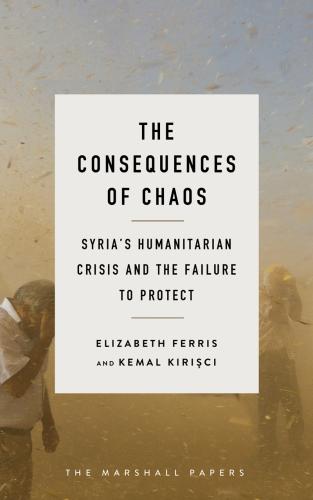
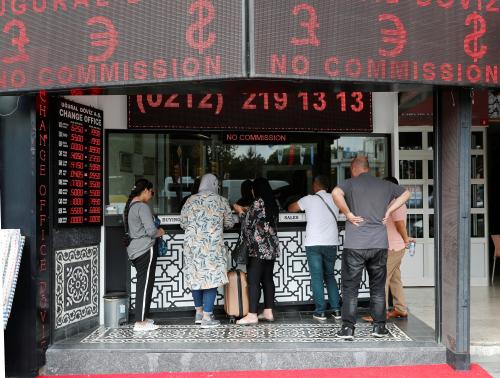
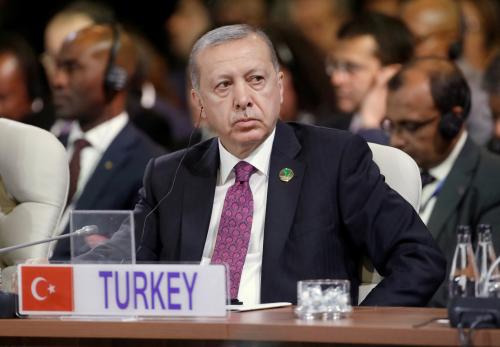


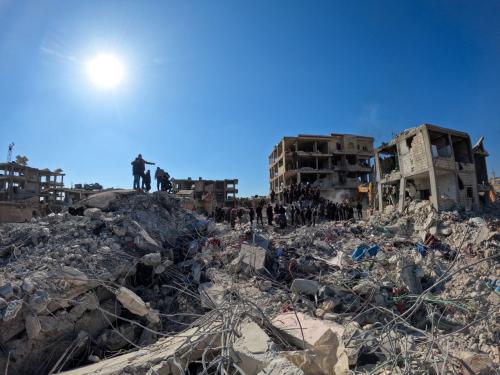
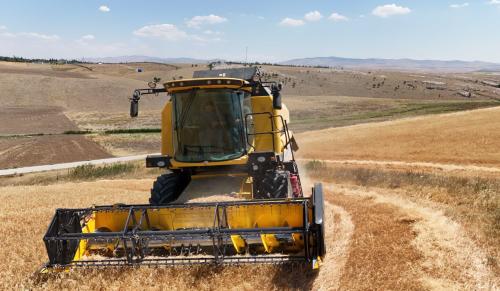
Commentary
The Idlib offensive could create a major refugee outflow—What should Turkey do?
September 6, 2018